A lot of people wonder why exes keep blocking and unblocking them on social media websites or I guess even phones. Well, I’ve spent most of the last ten years studying the behavior of exes in a post breakup environment and in my mind the “why” of it all really boils down to eight core reasons,
- Statistically It’s The Most Likely Outcome: Most Exes Who Block You Will Unblock You Without You Having To Do Anything
- They Were Using Their Friends Initially: Then they grew desperate and couldn’t take it themselves.
- The Pogo Sticking Effect: We’ve noticed a certain segment of exes will go back and forth between blocking and unblocking you a number of times creating a kind of pogo sticking effect.
- Communication Needs: There might be practical reasons to communicate, such as discussing shared responsibilities, returning belongings, or addressing mutual financial matters.
- Curiosity: They might be curious about how you’re doing post-breakup and want to check in on you.
- No Longer Feeling Threatened: Initially, they might have blocked you to avoid any negative or confrontational interactions. With time, they might feel that threat has passed.
- They’re At The Top Of The Death Wheel Again: They may have moved on to someone else, had it go bad and immediately run back to you in order to find someone new.
- Trying To Illicit A Reaction: They are testing to see if you’ll notice and reach out to them.
Let’s discuss!

What Are Your Chances of Getting Your Ex Boyfriend Back?
Take the quiz1) Statistically It’s The Most Likely Outcome
We often encounter panic from our clients when they discover that their ex has unblocked them.
They’re unsure about how to proceed, and what complicates matters is that the advice I offer is to do nothing.
This is because, statistically speaking, the most probable outcome is that your ex will unblock you. Blocking is, in essence, an emotional act. It’s an attempt to regain some control over a situation that feels uncontrollable.
A few years ago, I surveyed my clients who had been blocked by their exes, asking if their exes eventually unblocked them.
The responses were enlightening.
- 68% of respondents said their exes unblocked them without any prompting.
- 15% reported still being blocked
- While another 15% indicated a pattern of being blocked and unblocked repeatedly, a phenomenon I’ve affectionately termed “pogo sticking.” We’ll delve deeper into that shortly. T
- he remaining 2% shared that their exes partially unblocked them, meaning they were unblocked on some platforms and remained blocked on others.
What’s intriguing about these findings is that they highlight the tumultuous nature of breakups and the emotional toll they exact. If we view an ex blocking you as an emotional response, the fact that 68% of exes unblock, according to our survey, underscores its emotional nature.
As emotions stabilize, logic often prevails. Thus, the primary reason your ex unblocks you is that it’s statistically the most probable outcome.
2) They Were Using Their Friends Initially To Spy
I know this happens because I’ve done it myself.
I recall going through a breakup where I blocked my ex, yet I remained curious about her activities.
I asked my best friend at the time to show me his phone so I could catch glimpses of her updates.
Often, your ex might use their friends or mutual acquaintances to keep tabs on you. However, they might unblock you because they grow weary of this indirect method, or it becomes too cumbersome. So, they give in and unblock you, as is statistically most likely, allowing them to monitor your activities directly.
Another intriguing statistic to note: a study conducted by a graduate student in 2012 revealed that about 88% of individuals admitted to “Facebook stalking” their exes post-breakup.
This suggests that even if your ex blocks you, there’s a high likelihood they’re still keeping an eye on your social media presence.
3) The Pogo Sticking Effect
I touched upon this concept earlier, referencing the poll graphic above.
For clarity, the pogo sticking effect describes a cycle where an ex blocks you, then unblocks you, and this pattern continues in a seemingly endless loop.
Here’s a fun graphic I created to visualize this for you,
Why do exes engage in this behavior? There are several reasons.
Firstly, ambivalence plays a significant role. They might be grappling with their feelings towards you. At one moment, they might want to sever all connections, and the next, they’re intrigued by your life’s happenings. Blocking can sometimes be a coping mechanism for overwhelming emotions.
When these feelings wane, they might unblock you, only to revert when seeing your social activities triggers those emotions again.

What Are Your Chances of Getting Your Ex Boyfriend Back?
Take the quizControl dynamics might also be at play. This cyclical behavior can be a means of exerting control, making you second-guess their intentions and keeping you emotionally engaged. We’ll delve deeper into this shortly.
Much of this behavior can be attributed to our digital age’s impulsiveness. Actions on social media or messaging apps can be hasty. An ex might impulsively block you in anger and unblock you once they’ve calmed down, only to repeat this cycle.
This behavior can create a negative feedback loop. They might block you to shield themselves from pain.
However, curiosity eventually prevails, leading them to unblock and check your social media. Depending on what they find, they might feel anger or validation, leading to another round of blocking. The repetitive nature of this cycle can become addictive.
In a way, it’s akin to a drug addict seeking a fix. Your ex might be looking for assurance, hoping to see if you’re as distraught as they are. If you seem to be doing well, they might feel resentment, casting you as the antagonist. If you appear to be struggling, they might feel a sense of triumph, thinking they’re “winning” the breakup. Regardless, the cycle persists.
4) Communication Needs
This section will be relatively brief, as there isn’t an extensive amount to discuss.
Suppose your ex blocked you primarily for emotional reasons, aiming to regain some semblance of control. However, if your lives are deeply intertwined, complete disconnection might be impractical.
There could be genuine reasons to communicate, such as shared responsibilities, returning belongings, or discussing matters related to children, pets, or other mutual concerns.
I’ve observed that exes sometimes unblock simply because they need to address an issue that necessitates communication. As mentioned, this point is straightforward without much elaboration required.
5) Curiosity
So, there are a number of things that come to mind when I think of curiosity. At its core, curiosity is a fundamental human trait. After sharing a significant portion of your life with someone, it’s natural to wonder how they’re faring, especially after a significant event like a breakup.
As previously mentioned, statistics indicate that a majority of individuals will “Facebook stalk” their exes post-breakup. This fact alone underscores how breakups can spark curiosity.
What’s captivating about curiosity is that it often stems from the lingering emotional bonds that persist even after a relationship ends. Often, it’s about drawing a comparison, evaluating how one’s post-breakup trajectory compares to that of the ex.
This was touched upon in the discussion about the pogo-sticking effect. Curiosity leads to feedback, be it positive or negative. Regardless of the feedback’s nature, individuals often interpret it in a way that bolsters their ego.
For instance, if an ex perceives you as struggling post-breakup, it boosts their morale. Conversely, if you seem to be thriving, they might cast you in a negative light, converting their envy or resentment into a form of self-validation.
This tendency to use curiosity as an ego boost post-breakup is a fascinating psychological dynamic.
6) No Longer Feeling Threatened
Number six is the diminishing sense of threat. Initially, they might have blocked you to sidestep any potential negative or confrontational exchanges.
However, as time progresses, the intensity of that perceived threat wanes. I’ve included this point because a significant number of our clients identify with having an anxious attachment style, while many of their exes resonate with an avoidant attachment style.
Anxious client:
Avoidant Ex:
Individuals with an anxious attachment style often exhibit behaviors post-breakup that are commonly caricatured or mocked, such as desperately pleading for reconciliation, promising change, or attempting to mend what might be irreparable.

What Are Your Chances of Getting Your Ex Boyfriend Back?
Take the quizConversely, if you’ve been in a relationship with someone who exhibits a dismissive avoidant attachment style, as many of our clients have, that person is likely highly sensitive to potential overreactions, especially in public settings.
They aim to steer clear of any interaction that might lead to such confrontations. Confrontation is anathema to avoidants. It’s inherent in their nature; a dismissive avoidant seeks to evade conflict and commitment at every turn.
They might block you when they anticipate a confrontation. However, once they sense the threat has subsided and sufficient time has elapsed, they might unblock you, allowing their underlying curiosity to emerge.
7) They’re At The Top Of The Death Wheel Again
To grasp this concept, we need to reference a specific graphic, which I’ve termed the “avoidant death wheel.” This wheel comprises eight primary stages, illustrating the cyclical pattern I’ve observed many exes to be ensnared in. Notably, this wheel highlights when blocking and unblocking typically occur.
- Desire for Love: The cycle begins with a longing for someone to love them.
- Finding Someone: They believe they’ve found the one, thinking their search is over.
- Emerging Doubts: They begin to notice concerning aspects of the relationship.
- Thoughts of Departure: The idea of ending the relationship starts to take root.
- Decision to Leave: They choose to exit the relationship. This stage is where the breakup transpires. Between this stage and the next, based on your reaction to the breakup or their anticipation of your response, they’re likely to block you.
- Post-Breakup Elation: They revel in the relief and freedom post-separation.
- Onset of Loneliness: The initial joy fades, replaced by feelings of isolation.
- Despair and Reflection: They lament, “Why can’t I ever find the right person?”
This introspection loops them back to the initial stage of desiring love.
As they transition back to the first stage, yearning for love and connection, they’re inclined to unblock you. It’s not necessarily an indication of wanting to reconcile, but rather a search for affection and familiarity.
Given your shared history and the romantic nostalgia associated with it, they might be drawn back to you. While it might sound unflattering, think of it as them seeking comfort in a known entity.
8) Trying To Illicit A Reaction
Essentially, they’re gauging whether you’ll initiate contact.
This behavior often aligns with the pogo sticking effect, where they oscillate between blocking and unblocking you multiple times. The underlying motive could be to ascertain your interest level, to see if you’ll reach out post-block.
This tactic is frequently employed by avoidants. Typically, avoidants are apprehensive about making the first move. Consequently, to prompt a reaction from you, to “test the waters” or “dip their toes in,” they’ll unblock you and adopt a wait-and-see approach.
They’re on the lookout for signs: whether you’ve noticed the unblocking, if you’re engaging with their social media posts, or if you’ll contact them directly. Their primary objective is to gauge your reaction without risking rejection, making this their convoluted method of assessment.
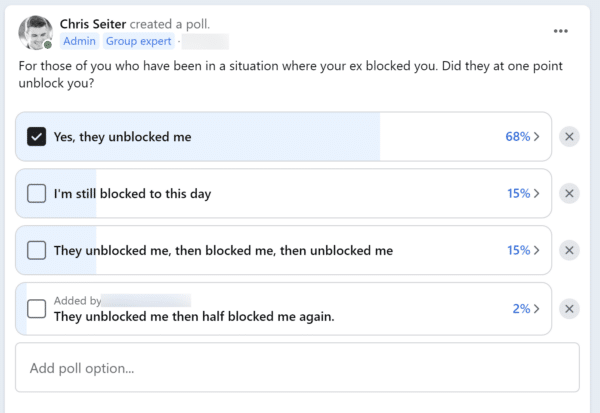
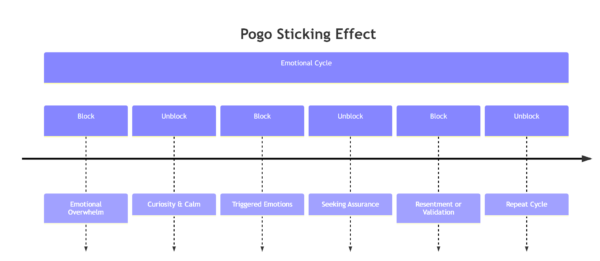
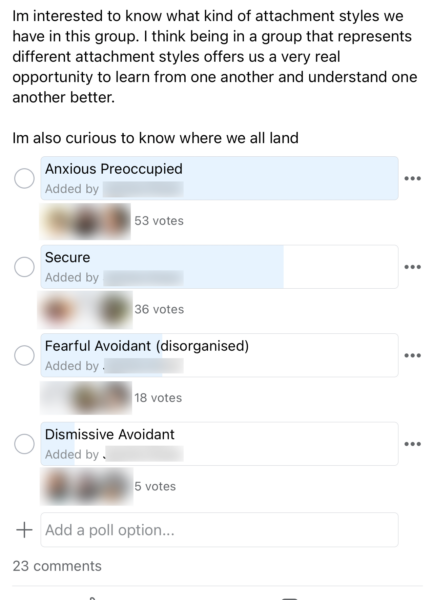
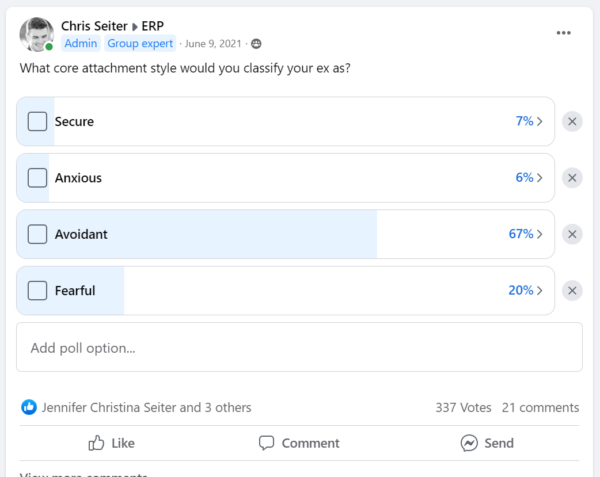
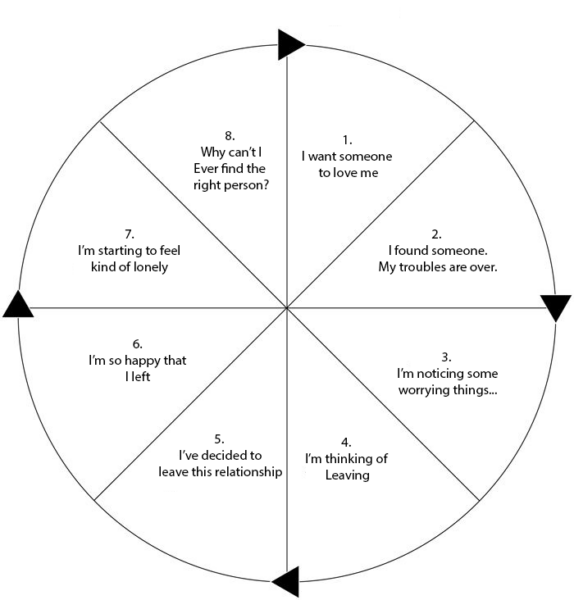
Cee
June 2, 2024 at 1:43 pm
I met a guy on Tinder and we began talking for a little over two months. It was long distance and I thought we were moving towards a relationship and meeting irl. We had disagreements regarding communication and consistency with me asking for more (he did try though). He kept saying we’re too different and we should go out separate ways but after more discussion he agreed to try again. The messages became a bit less and he said he can’t give what I wanted, I still asked for reconsideration but I spiralled and messaged him a lot and pushed him (too much) when he was dealing with other personal things(I regret these actions). But he blocked me on what’s app and Facebook. Is there a chance he’ll reach back out? I really want to apologise and maybe see if there’s anything there.
Tracey Roberts
June 2, 2024 at 9:19 am
Hi my ex dumped me over a silly post I put on facebook .
Blocked me on facebook and restricted on messenger.
The next day he has unblocked me on facebook why .
Mr. Gary Keohane
March 16, 2024 at 7:38 am
Very good indeed. Thank you for sharing.